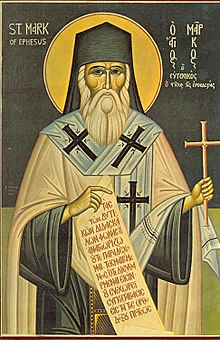Mark of Ephesus
| Saint Mark of Ephesus | |
|---|---|
 |
|
| Archbishop of Ephesus | |
| Born | 1392 Constantinople |
| Died | June 23, 1444 (age 52) Constantinople |
| Venerated in | Eastern Orthodox Church |
| Canonized | 1734, Constantinople by Patriarch Seraphim of Constantinople |
| Feast | January 19 |
| Attributes | Long white beard, vested as a bishop, holding a scroll in one hand and Cross in the other |
Mark of Ephesus (born Manuel Eugenikos) was a hesychast theologian of the late Palaiologan period who became famous for his rejection of the Council of Ferrara-Florence (1438–1439). As a monk in Constantinople, Mark was a prolific hymnographer and a devoted Palamite. As a theologian and a scholar, he was instrumental in the preparations for the Council of Ferrara-Florence, and as Metropolitan of Ephesus and delegate for the Patriarch of Alexandria, he was one of the most important voices at the synod. After renouncing the Council as a lost cause, Mark became the leader of the Orthodox opposition to the Union of Florence, thus sealing his reputation as a defender of Orthodoxy and pillar of the Church.
Mark was born Manuel in 1392 in Constantinople to George, sakellarios of Hagia Sophia, an Orthodox deacon, and Maria, the daughter of a devout doctor named Luke. Mark learned how to read and write from his father, who died while Mark and his younger brother John Eugenikos were still children. Maria had Mark continue his education under John Chortasmenos, who later became Metropolitan Ignatius of Selymbria, and a mathematician and philosopher by the name of Gemistus Pletho.
Mark was the only Eastern bishop who refused to sign the agreement with the Roman Catholic Church on a compromise formula, "ex filio," for the Filioque clause disagreement, during the Council of Ferrara. He held that Rome continued in both heresy and schism. He also rejected the doctrine of Purgatory, in that he objected to the existence of a purgatorial fire that "purified" the souls of the faithful. The doctrine of "purgatorial fire" was typical of medieval Roman Catholic theology. In the end, Mark won this aspect of the discussions in the purgatorial debates, since the final formula of union omitted any affirmation of "fire" in reference to the lot of souls after their death and before the beatific vision.
...
Wikipedia
